Corporate Governance and Sustainability Reporting
VerifiedAdded on 2023/06/04
|10
|1936
|498
AI Summary
This paper highlights the importance of sustainability accounting and the extent up to which it can be sufficiently improved by efficient implementation of corporate governance and operational management in the fields of communication, accounting as well as organizational strategy making.
Contribute Materials
Your contribution can guide someone’s learning journey. Share your
documents today.
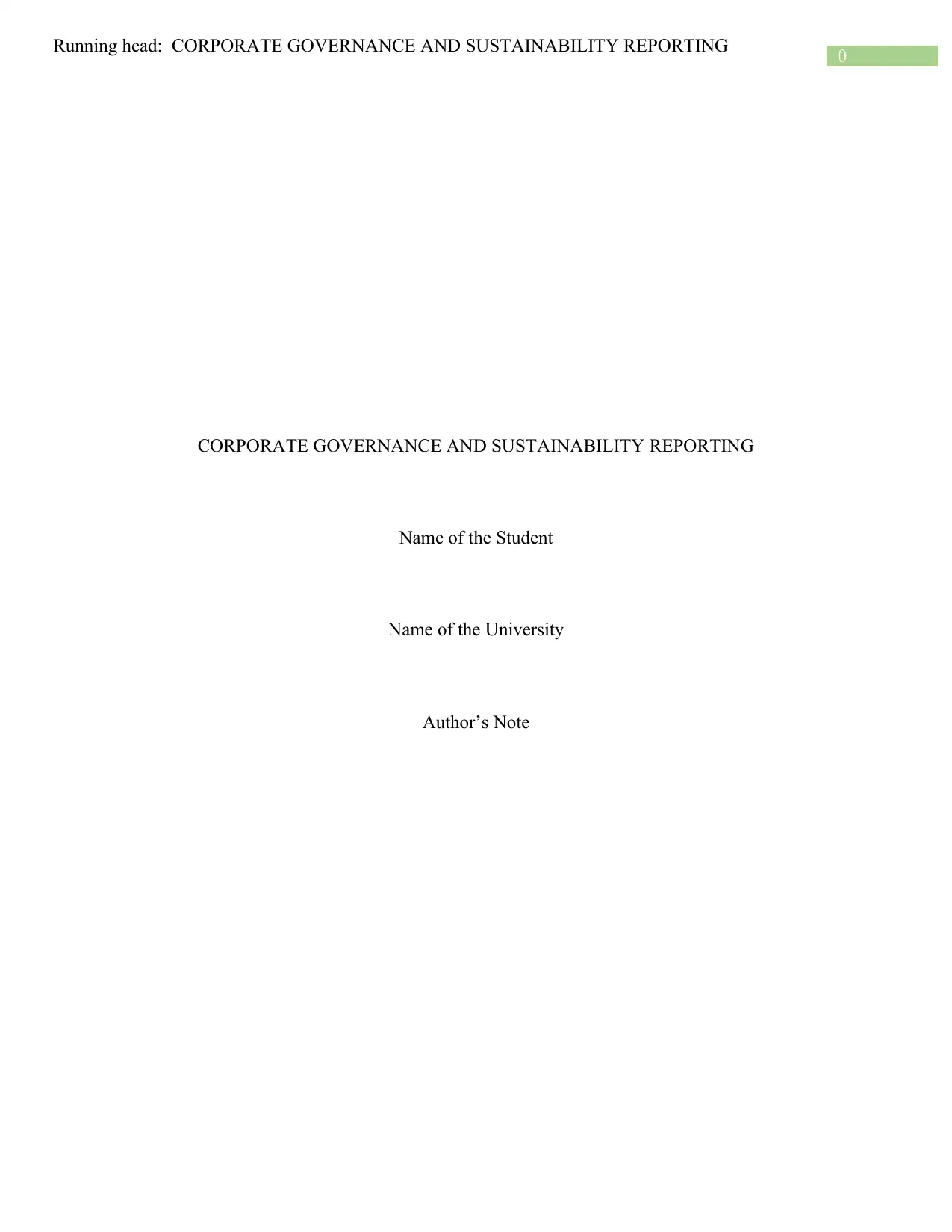
0
Running head: CORPORATE GOVERNANCE AND SUSTAINABILITY REPORTING
CORPORATE GOVERNANCE AND SUSTAINABILITY REPORTING
Name of the Student
Name of the University
Author’s Note
Running head: CORPORATE GOVERNANCE AND SUSTAINABILITY REPORTING
CORPORATE GOVERNANCE AND SUSTAINABILITY REPORTING
Name of the Student
Name of the University
Author’s Note
Secure Best Marks with AI Grader
Need help grading? Try our AI Grader for instant feedback on your assignments.
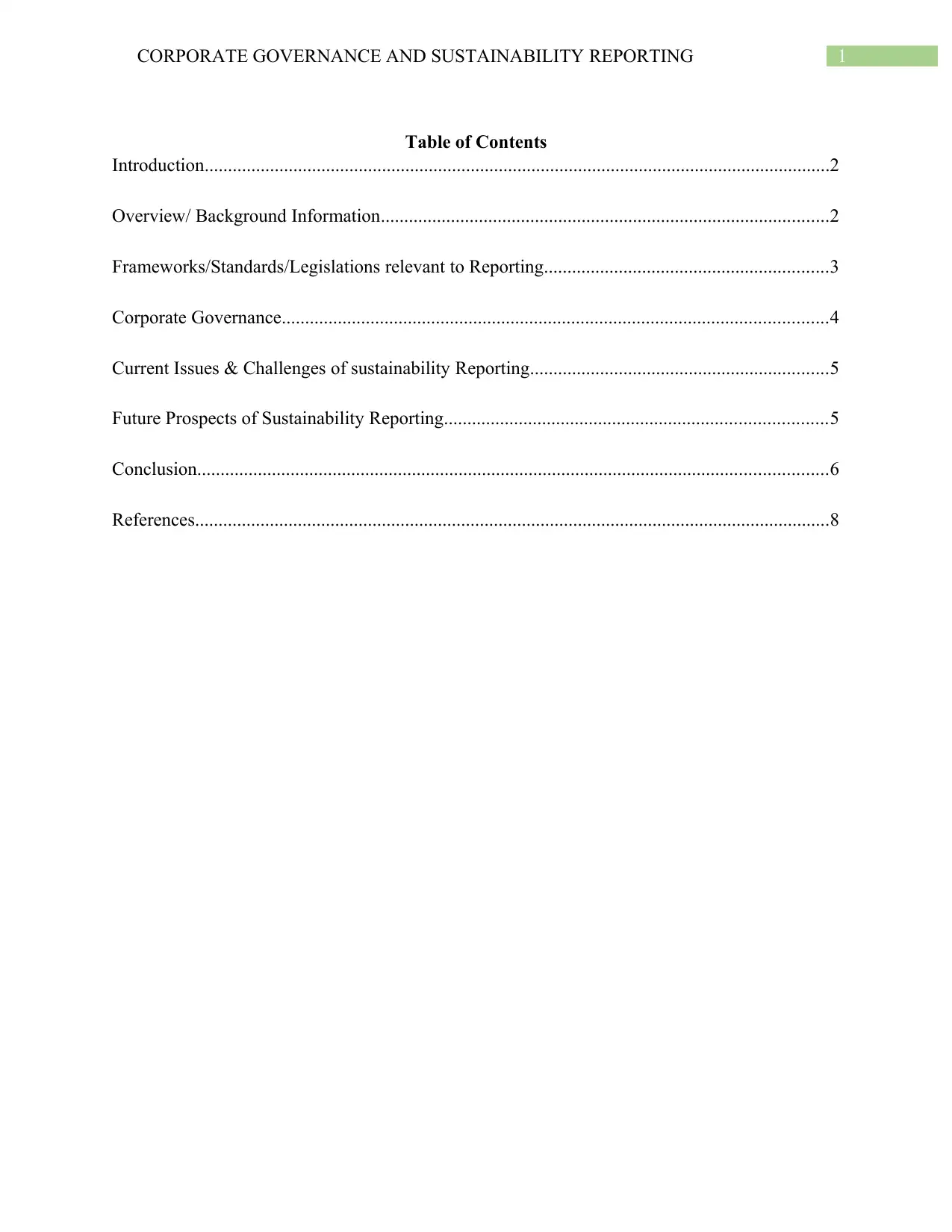
1CORPORATE GOVERNANCE AND SUSTAINABILITY REPORTING
Table of Contents
Introduction......................................................................................................................................2
Overview/ Background Information................................................................................................2
Frameworks/Standards/Legislations relevant to Reporting.............................................................3
Corporate Governance.....................................................................................................................4
Current Issues & Challenges of sustainability Reporting................................................................5
Future Prospects of Sustainability Reporting..................................................................................5
Conclusion.......................................................................................................................................6
References........................................................................................................................................8
Table of Contents
Introduction......................................................................................................................................2
Overview/ Background Information................................................................................................2
Frameworks/Standards/Legislations relevant to Reporting.............................................................3
Corporate Governance.....................................................................................................................4
Current Issues & Challenges of sustainability Reporting................................................................5
Future Prospects of Sustainability Reporting..................................................................................5
Conclusion.......................................................................................................................................6
References........................................................................................................................................8
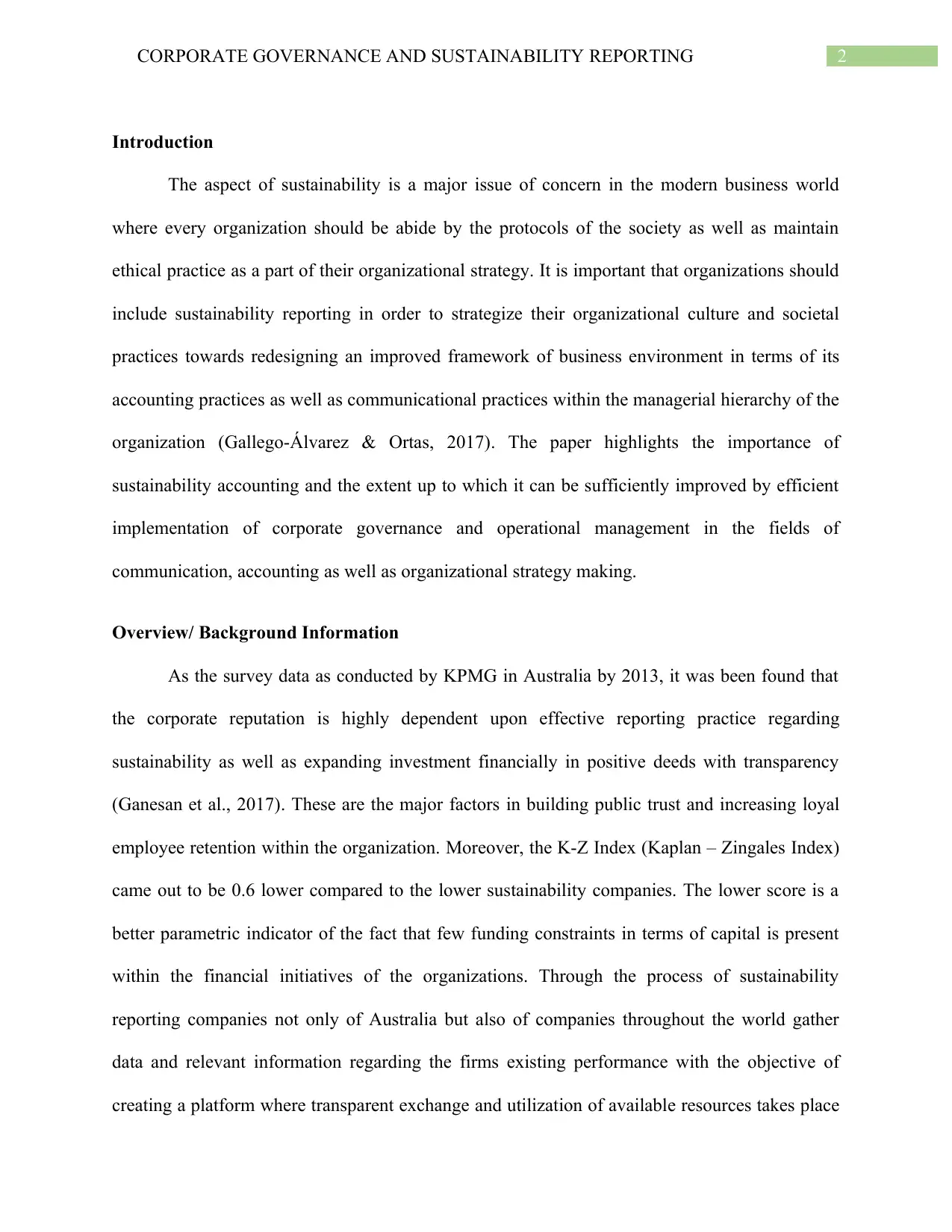
2CORPORATE GOVERNANCE AND SUSTAINABILITY REPORTING
Introduction
The aspect of sustainability is a major issue of concern in the modern business world
where every organization should be abide by the protocols of the society as well as maintain
ethical practice as a part of their organizational strategy. It is important that organizations should
include sustainability reporting in order to strategize their organizational culture and societal
practices towards redesigning an improved framework of business environment in terms of its
accounting practices as well as communicational practices within the managerial hierarchy of the
organization (Gallego-Álvarez & Ortas, 2017). The paper highlights the importance of
sustainability accounting and the extent up to which it can be sufficiently improved by efficient
implementation of corporate governance and operational management in the fields of
communication, accounting as well as organizational strategy making.
Overview/ Background Information
As the survey data as conducted by KPMG in Australia by 2013, it was been found that
the corporate reputation is highly dependent upon effective reporting practice regarding
sustainability as well as expanding investment financially in positive deeds with transparency
(Ganesan et al., 2017). These are the major factors in building public trust and increasing loyal
employee retention within the organization. Moreover, the K-Z Index (Kaplan – Zingales Index)
came out to be 0.6 lower compared to the lower sustainability companies. The lower score is a
better parametric indicator of the fact that few funding constraints in terms of capital is present
within the financial initiatives of the organizations. Through the process of sustainability
reporting companies not only of Australia but also of companies throughout the world gather
data and relevant information regarding the firms existing performance with the objective of
creating a platform where transparent exchange and utilization of available resources takes place
Introduction
The aspect of sustainability is a major issue of concern in the modern business world
where every organization should be abide by the protocols of the society as well as maintain
ethical practice as a part of their organizational strategy. It is important that organizations should
include sustainability reporting in order to strategize their organizational culture and societal
practices towards redesigning an improved framework of business environment in terms of its
accounting practices as well as communicational practices within the managerial hierarchy of the
organization (Gallego-Álvarez & Ortas, 2017). The paper highlights the importance of
sustainability accounting and the extent up to which it can be sufficiently improved by efficient
implementation of corporate governance and operational management in the fields of
communication, accounting as well as organizational strategy making.
Overview/ Background Information
As the survey data as conducted by KPMG in Australia by 2013, it was been found that
the corporate reputation is highly dependent upon effective reporting practice regarding
sustainability as well as expanding investment financially in positive deeds with transparency
(Ganesan et al., 2017). These are the major factors in building public trust and increasing loyal
employee retention within the organization. Moreover, the K-Z Index (Kaplan – Zingales Index)
came out to be 0.6 lower compared to the lower sustainability companies. The lower score is a
better parametric indicator of the fact that few funding constraints in terms of capital is present
within the financial initiatives of the organizations. Through the process of sustainability
reporting companies not only of Australia but also of companies throughout the world gather
data and relevant information regarding the firms existing performance with the objective of
creating a platform where transparent exchange and utilization of available resources takes place
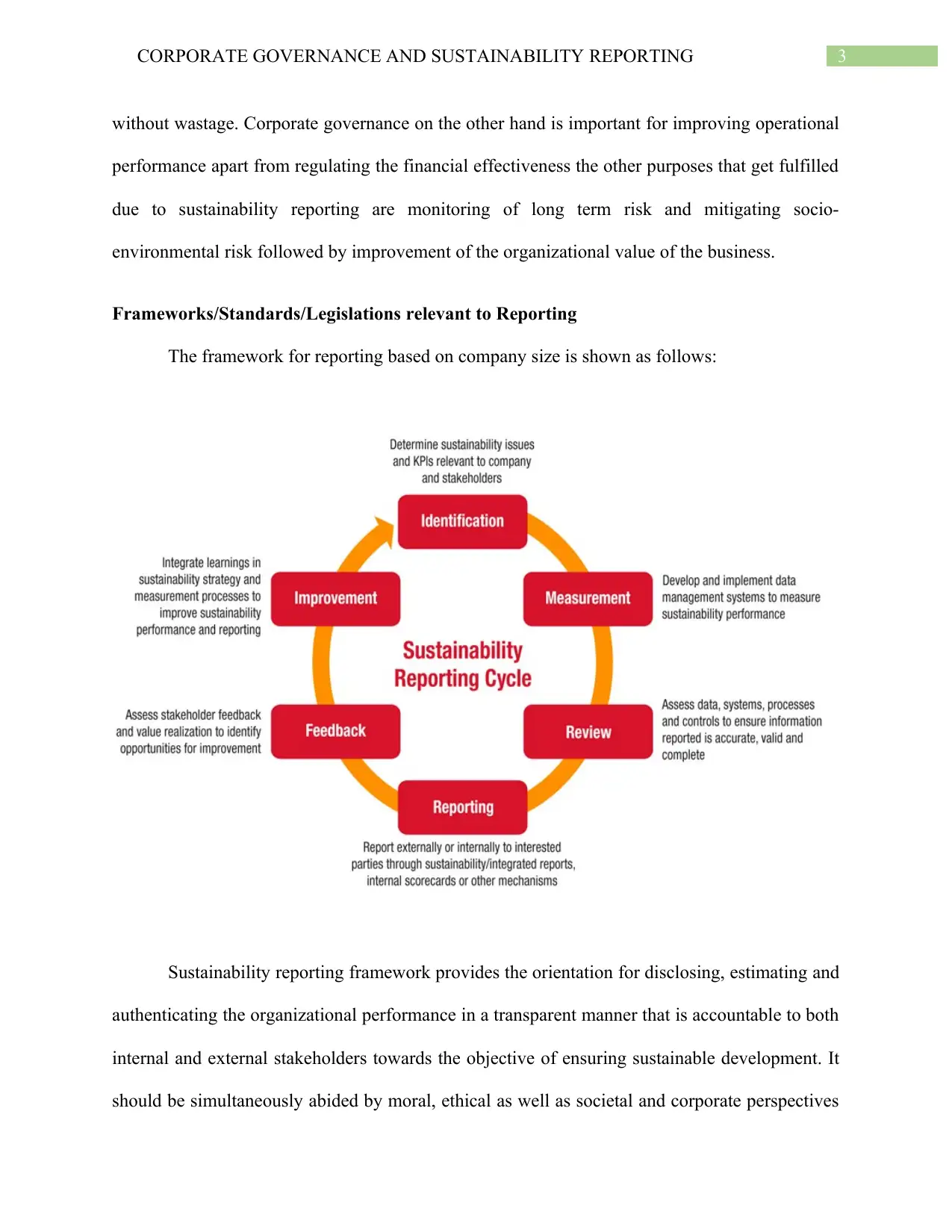
3CORPORATE GOVERNANCE AND SUSTAINABILITY REPORTING
without wastage. Corporate governance on the other hand is important for improving operational
performance apart from regulating the financial effectiveness the other purposes that get fulfilled
due to sustainability reporting are monitoring of long term risk and mitigating socio-
environmental risk followed by improvement of the organizational value of the business.
Frameworks/Standards/Legislations relevant to Reporting
The framework for reporting based on company size is shown as follows:
Sustainability reporting framework provides the orientation for disclosing, estimating and
authenticating the organizational performance in a transparent manner that is accountable to both
internal and external stakeholders towards the objective of ensuring sustainable development. It
should be simultaneously abided by moral, ethical as well as societal and corporate perspectives
without wastage. Corporate governance on the other hand is important for improving operational
performance apart from regulating the financial effectiveness the other purposes that get fulfilled
due to sustainability reporting are monitoring of long term risk and mitigating socio-
environmental risk followed by improvement of the organizational value of the business.
Frameworks/Standards/Legislations relevant to Reporting
The framework for reporting based on company size is shown as follows:
Sustainability reporting framework provides the orientation for disclosing, estimating and
authenticating the organizational performance in a transparent manner that is accountable to both
internal and external stakeholders towards the objective of ensuring sustainable development. It
should be simultaneously abided by moral, ethical as well as societal and corporate perspectives
Secure Best Marks with AI Grader
Need help grading? Try our AI Grader for instant feedback on your assignments.
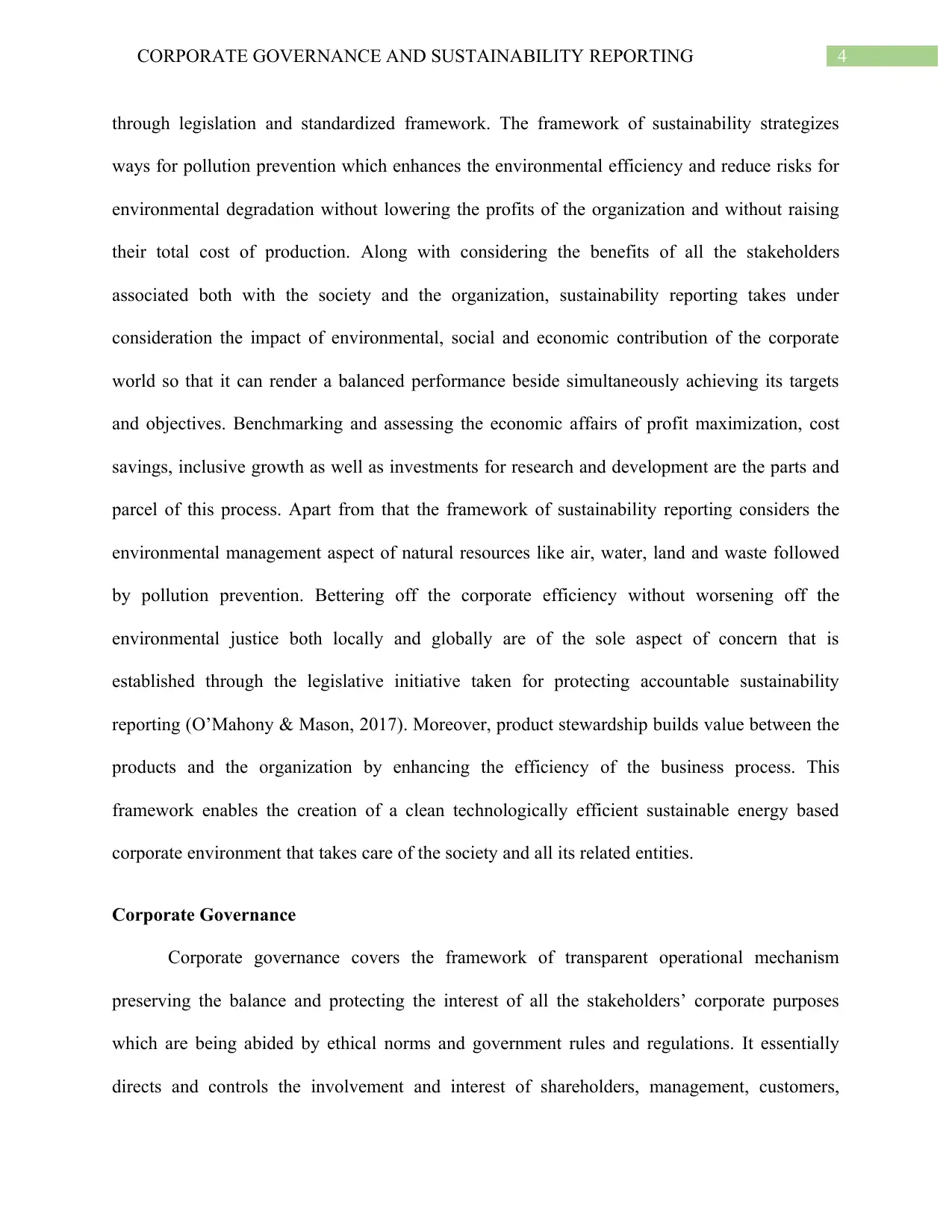
4CORPORATE GOVERNANCE AND SUSTAINABILITY REPORTING
through legislation and standardized framework. The framework of sustainability strategizes
ways for pollution prevention which enhances the environmental efficiency and reduce risks for
environmental degradation without lowering the profits of the organization and without raising
their total cost of production. Along with considering the benefits of all the stakeholders
associated both with the society and the organization, sustainability reporting takes under
consideration the impact of environmental, social and economic contribution of the corporate
world so that it can render a balanced performance beside simultaneously achieving its targets
and objectives. Benchmarking and assessing the economic affairs of profit maximization, cost
savings, inclusive growth as well as investments for research and development are the parts and
parcel of this process. Apart from that the framework of sustainability reporting considers the
environmental management aspect of natural resources like air, water, land and waste followed
by pollution prevention. Bettering off the corporate efficiency without worsening off the
environmental justice both locally and globally are of the sole aspect of concern that is
established through the legislative initiative taken for protecting accountable sustainability
reporting (O’Mahony & Mason, 2017). Moreover, product stewardship builds value between the
products and the organization by enhancing the efficiency of the business process. This
framework enables the creation of a clean technologically efficient sustainable energy based
corporate environment that takes care of the society and all its related entities.
Corporate Governance
Corporate governance covers the framework of transparent operational mechanism
preserving the balance and protecting the interest of all the stakeholders’ corporate purposes
which are being abided by ethical norms and government rules and regulations. It essentially
directs and controls the involvement and interest of shareholders, management, customers,
through legislation and standardized framework. The framework of sustainability strategizes
ways for pollution prevention which enhances the environmental efficiency and reduce risks for
environmental degradation without lowering the profits of the organization and without raising
their total cost of production. Along with considering the benefits of all the stakeholders
associated both with the society and the organization, sustainability reporting takes under
consideration the impact of environmental, social and economic contribution of the corporate
world so that it can render a balanced performance beside simultaneously achieving its targets
and objectives. Benchmarking and assessing the economic affairs of profit maximization, cost
savings, inclusive growth as well as investments for research and development are the parts and
parcel of this process. Apart from that the framework of sustainability reporting considers the
environmental management aspect of natural resources like air, water, land and waste followed
by pollution prevention. Bettering off the corporate efficiency without worsening off the
environmental justice both locally and globally are of the sole aspect of concern that is
established through the legislative initiative taken for protecting accountable sustainability
reporting (O’Mahony & Mason, 2017). Moreover, product stewardship builds value between the
products and the organization by enhancing the efficiency of the business process. This
framework enables the creation of a clean technologically efficient sustainable energy based
corporate environment that takes care of the society and all its related entities.
Corporate Governance
Corporate governance covers the framework of transparent operational mechanism
preserving the balance and protecting the interest of all the stakeholders’ corporate purposes
which are being abided by ethical norms and government rules and regulations. It essentially
directs and controls the involvement and interest of shareholders, management, customers,
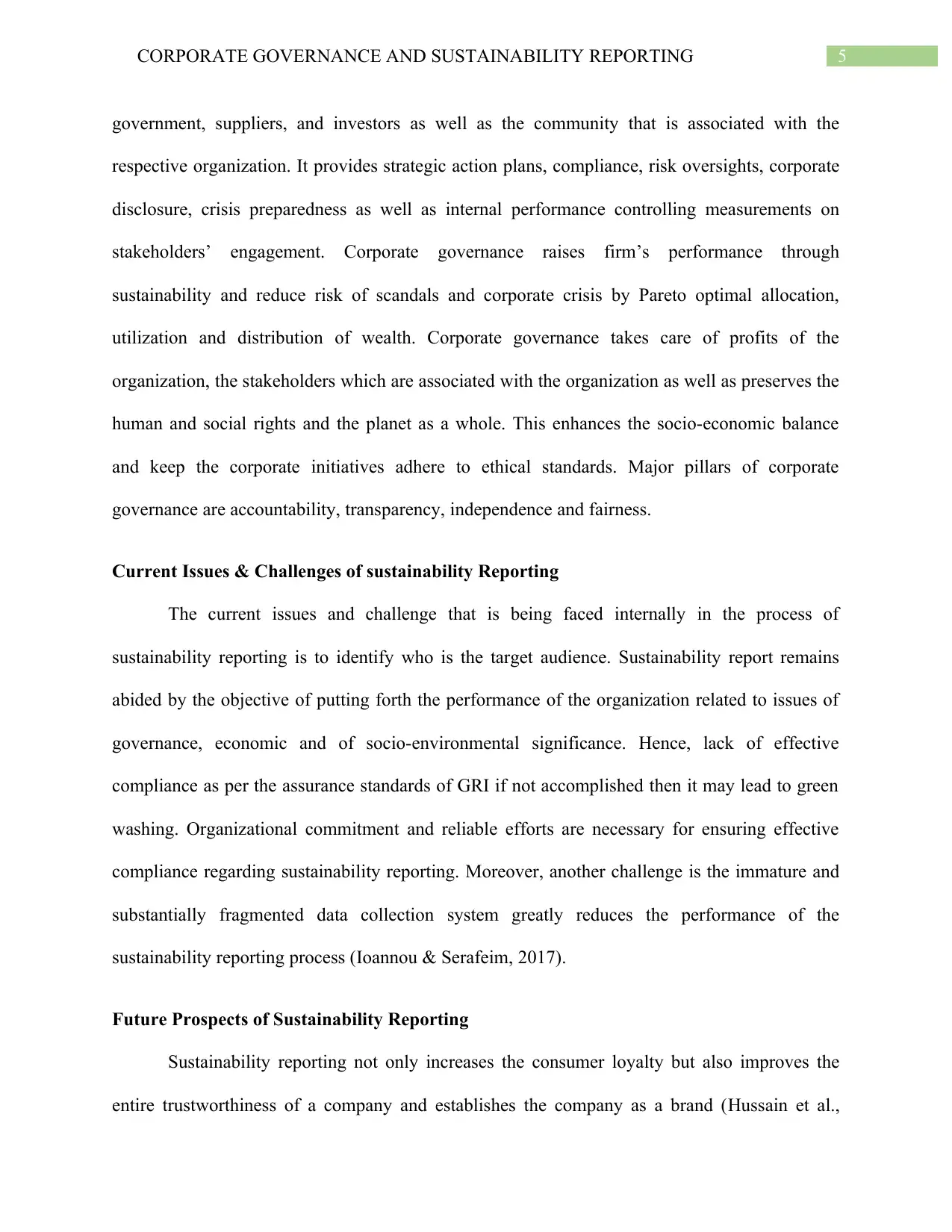
5CORPORATE GOVERNANCE AND SUSTAINABILITY REPORTING
government, suppliers, and investors as well as the community that is associated with the
respective organization. It provides strategic action plans, compliance, risk oversights, corporate
disclosure, crisis preparedness as well as internal performance controlling measurements on
stakeholders’ engagement. Corporate governance raises firm’s performance through
sustainability and reduce risk of scandals and corporate crisis by Pareto optimal allocation,
utilization and distribution of wealth. Corporate governance takes care of profits of the
organization, the stakeholders which are associated with the organization as well as preserves the
human and social rights and the planet as a whole. This enhances the socio-economic balance
and keep the corporate initiatives adhere to ethical standards. Major pillars of corporate
governance are accountability, transparency, independence and fairness.
Current Issues & Challenges of sustainability Reporting
The current issues and challenge that is being faced internally in the process of
sustainability reporting is to identify who is the target audience. Sustainability report remains
abided by the objective of putting forth the performance of the organization related to issues of
governance, economic and of socio-environmental significance. Hence, lack of effective
compliance as per the assurance standards of GRI if not accomplished then it may lead to green
washing. Organizational commitment and reliable efforts are necessary for ensuring effective
compliance regarding sustainability reporting. Moreover, another challenge is the immature and
substantially fragmented data collection system greatly reduces the performance of the
sustainability reporting process (Ioannou & Serafeim, 2017).
Future Prospects of Sustainability Reporting
Sustainability reporting not only increases the consumer loyalty but also improves the
entire trustworthiness of a company and establishes the company as a brand (Hussain et al.,
government, suppliers, and investors as well as the community that is associated with the
respective organization. It provides strategic action plans, compliance, risk oversights, corporate
disclosure, crisis preparedness as well as internal performance controlling measurements on
stakeholders’ engagement. Corporate governance raises firm’s performance through
sustainability and reduce risk of scandals and corporate crisis by Pareto optimal allocation,
utilization and distribution of wealth. Corporate governance takes care of profits of the
organization, the stakeholders which are associated with the organization as well as preserves the
human and social rights and the planet as a whole. This enhances the socio-economic balance
and keep the corporate initiatives adhere to ethical standards. Major pillars of corporate
governance are accountability, transparency, independence and fairness.
Current Issues & Challenges of sustainability Reporting
The current issues and challenge that is being faced internally in the process of
sustainability reporting is to identify who is the target audience. Sustainability report remains
abided by the objective of putting forth the performance of the organization related to issues of
governance, economic and of socio-environmental significance. Hence, lack of effective
compliance as per the assurance standards of GRI if not accomplished then it may lead to green
washing. Organizational commitment and reliable efforts are necessary for ensuring effective
compliance regarding sustainability reporting. Moreover, another challenge is the immature and
substantially fragmented data collection system greatly reduces the performance of the
sustainability reporting process (Ioannou & Serafeim, 2017).
Future Prospects of Sustainability Reporting
Sustainability reporting not only increases the consumer loyalty but also improves the
entire trustworthiness of a company and establishes the company as a brand (Hussain et al.,
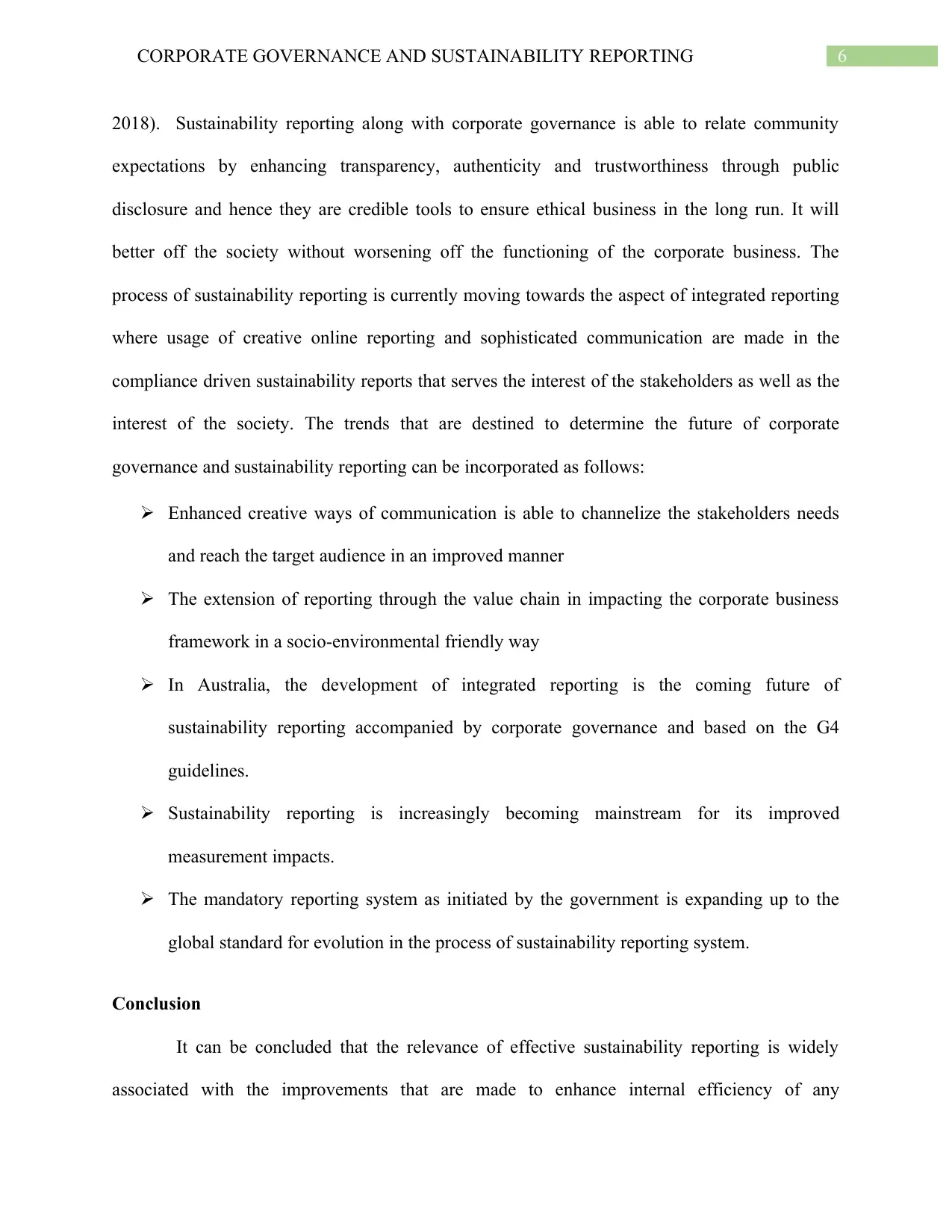
6CORPORATE GOVERNANCE AND SUSTAINABILITY REPORTING
2018). Sustainability reporting along with corporate governance is able to relate community
expectations by enhancing transparency, authenticity and trustworthiness through public
disclosure and hence they are credible tools to ensure ethical business in the long run. It will
better off the society without worsening off the functioning of the corporate business. The
process of sustainability reporting is currently moving towards the aspect of integrated reporting
where usage of creative online reporting and sophisticated communication are made in the
compliance driven sustainability reports that serves the interest of the stakeholders as well as the
interest of the society. The trends that are destined to determine the future of corporate
governance and sustainability reporting can be incorporated as follows:
Enhanced creative ways of communication is able to channelize the stakeholders needs
and reach the target audience in an improved manner
The extension of reporting through the value chain in impacting the corporate business
framework in a socio-environmental friendly way
In Australia, the development of integrated reporting is the coming future of
sustainability reporting accompanied by corporate governance and based on the G4
guidelines.
Sustainability reporting is increasingly becoming mainstream for its improved
measurement impacts.
The mandatory reporting system as initiated by the government is expanding up to the
global standard for evolution in the process of sustainability reporting system.
Conclusion
It can be concluded that the relevance of effective sustainability reporting is widely
associated with the improvements that are made to enhance internal efficiency of any
2018). Sustainability reporting along with corporate governance is able to relate community
expectations by enhancing transparency, authenticity and trustworthiness through public
disclosure and hence they are credible tools to ensure ethical business in the long run. It will
better off the society without worsening off the functioning of the corporate business. The
process of sustainability reporting is currently moving towards the aspect of integrated reporting
where usage of creative online reporting and sophisticated communication are made in the
compliance driven sustainability reports that serves the interest of the stakeholders as well as the
interest of the society. The trends that are destined to determine the future of corporate
governance and sustainability reporting can be incorporated as follows:
Enhanced creative ways of communication is able to channelize the stakeholders needs
and reach the target audience in an improved manner
The extension of reporting through the value chain in impacting the corporate business
framework in a socio-environmental friendly way
In Australia, the development of integrated reporting is the coming future of
sustainability reporting accompanied by corporate governance and based on the G4
guidelines.
Sustainability reporting is increasingly becoming mainstream for its improved
measurement impacts.
The mandatory reporting system as initiated by the government is expanding up to the
global standard for evolution in the process of sustainability reporting system.
Conclusion
It can be concluded that the relevance of effective sustainability reporting is widely
associated with the improvements that are made to enhance internal efficiency of any
Paraphrase This Document
Need a fresh take? Get an instant paraphrase of this document with our AI Paraphraser
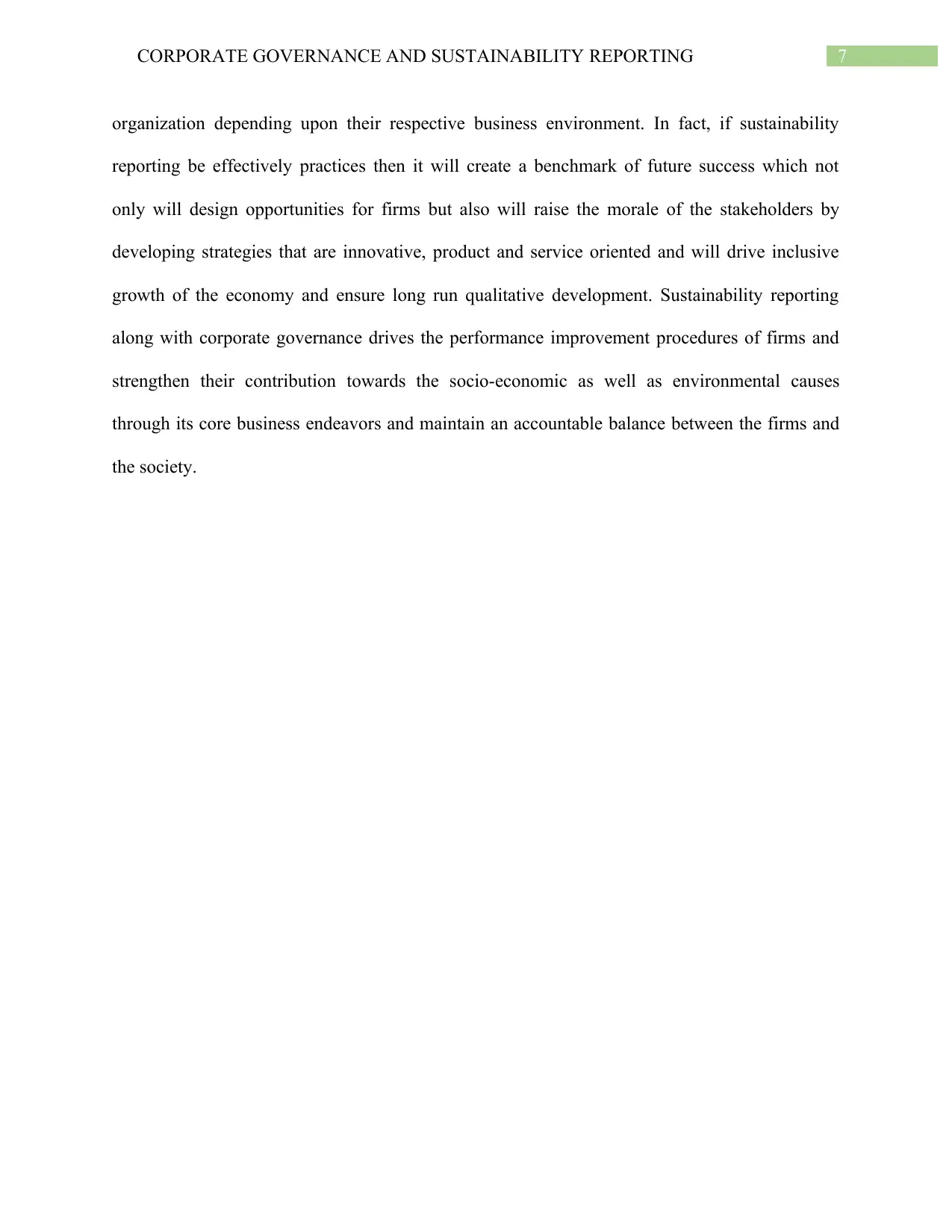
7CORPORATE GOVERNANCE AND SUSTAINABILITY REPORTING
organization depending upon their respective business environment. In fact, if sustainability
reporting be effectively practices then it will create a benchmark of future success which not
only will design opportunities for firms but also will raise the morale of the stakeholders by
developing strategies that are innovative, product and service oriented and will drive inclusive
growth of the economy and ensure long run qualitative development. Sustainability reporting
along with corporate governance drives the performance improvement procedures of firms and
strengthen their contribution towards the socio-economic as well as environmental causes
through its core business endeavors and maintain an accountable balance between the firms and
the society.
organization depending upon their respective business environment. In fact, if sustainability
reporting be effectively practices then it will create a benchmark of future success which not
only will design opportunities for firms but also will raise the morale of the stakeholders by
developing strategies that are innovative, product and service oriented and will drive inclusive
growth of the economy and ensure long run qualitative development. Sustainability reporting
along with corporate governance drives the performance improvement procedures of firms and
strengthen their contribution towards the socio-economic as well as environmental causes
through its core business endeavors and maintain an accountable balance between the firms and
the society.
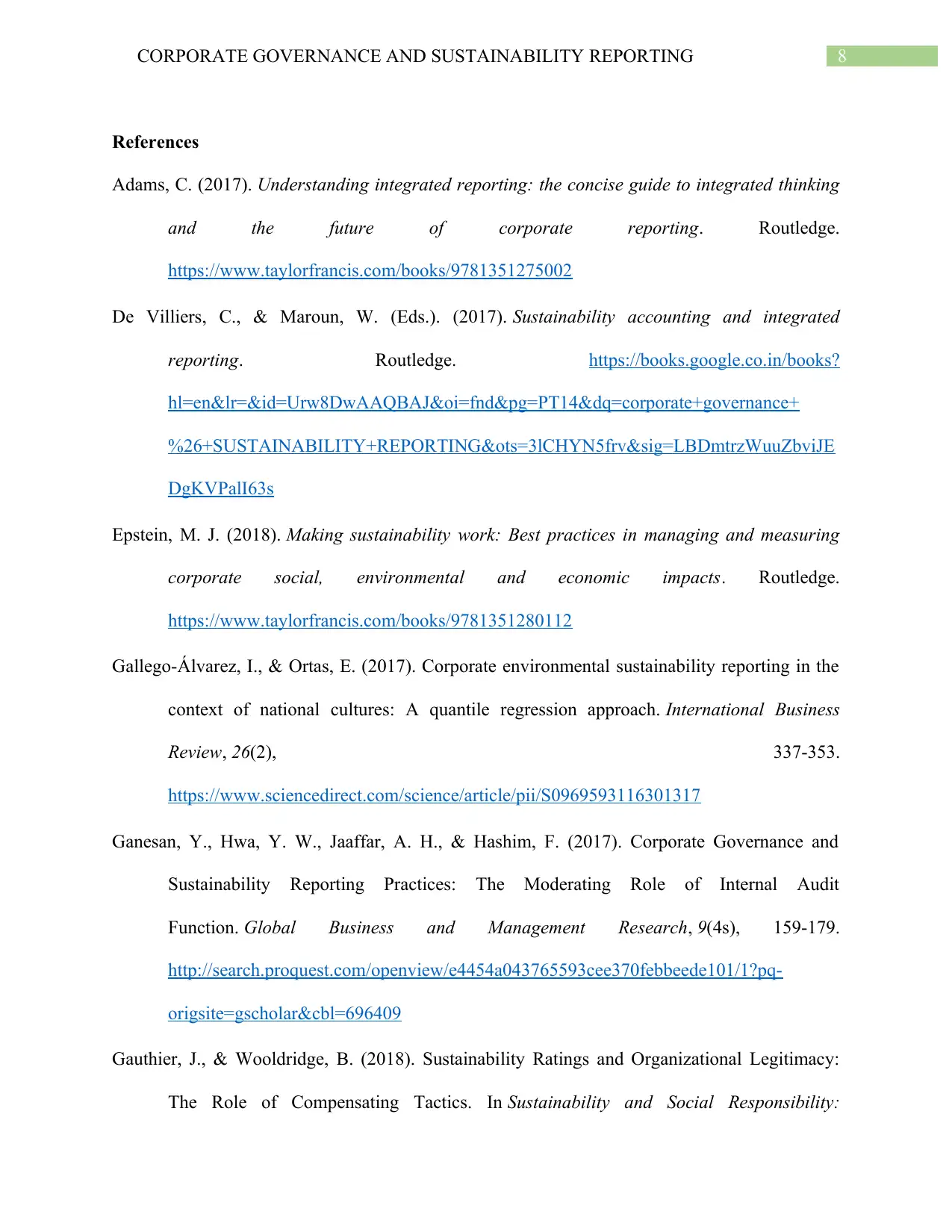
8CORPORATE GOVERNANCE AND SUSTAINABILITY REPORTING
References
Adams, C. (2017). Understanding integrated reporting: the concise guide to integrated thinking
and the future of corporate reporting. Routledge.
https://www.taylorfrancis.com/books/9781351275002
De Villiers, C., & Maroun, W. (Eds.). (2017). Sustainability accounting and integrated
reporting. Routledge. https://books.google.co.in/books?
hl=en&lr=&id=Urw8DwAAQBAJ&oi=fnd&pg=PT14&dq=corporate+governance+
%26+SUSTAINABILITY+REPORTING&ots=3lCHYN5frv&sig=LBDmtrzWuuZbviJE
DgKVPalI63s
Epstein, M. J. (2018). Making sustainability work: Best practices in managing and measuring
corporate social, environmental and economic impacts. Routledge.
https://www.taylorfrancis.com/books/9781351280112
Gallego-Álvarez, I., & Ortas, E. (2017). Corporate environmental sustainability reporting in the
context of national cultures: A quantile regression approach. International Business
Review, 26(2), 337-353.
https://www.sciencedirect.com/science/article/pii/S0969593116301317
Ganesan, Y., Hwa, Y. W., Jaaffar, A. H., & Hashim, F. (2017). Corporate Governance and
Sustainability Reporting Practices: The Moderating Role of Internal Audit
Function. Global Business and Management Research, 9(4s), 159-179.
http://search.proquest.com/openview/e4454a043765593cee370febbeede101/1?pq-
origsite=gscholar&cbl=696409
Gauthier, J., & Wooldridge, B. (2018). Sustainability Ratings and Organizational Legitimacy:
The Role of Compensating Tactics. In Sustainability and Social Responsibility:
References
Adams, C. (2017). Understanding integrated reporting: the concise guide to integrated thinking
and the future of corporate reporting. Routledge.
https://www.taylorfrancis.com/books/9781351275002
De Villiers, C., & Maroun, W. (Eds.). (2017). Sustainability accounting and integrated
reporting. Routledge. https://books.google.co.in/books?
hl=en&lr=&id=Urw8DwAAQBAJ&oi=fnd&pg=PT14&dq=corporate+governance+
%26+SUSTAINABILITY+REPORTING&ots=3lCHYN5frv&sig=LBDmtrzWuuZbviJE
DgKVPalI63s
Epstein, M. J. (2018). Making sustainability work: Best practices in managing and measuring
corporate social, environmental and economic impacts. Routledge.
https://www.taylorfrancis.com/books/9781351280112
Gallego-Álvarez, I., & Ortas, E. (2017). Corporate environmental sustainability reporting in the
context of national cultures: A quantile regression approach. International Business
Review, 26(2), 337-353.
https://www.sciencedirect.com/science/article/pii/S0969593116301317
Ganesan, Y., Hwa, Y. W., Jaaffar, A. H., & Hashim, F. (2017). Corporate Governance and
Sustainability Reporting Practices: The Moderating Role of Internal Audit
Function. Global Business and Management Research, 9(4s), 159-179.
http://search.proquest.com/openview/e4454a043765593cee370febbeede101/1?pq-
origsite=gscholar&cbl=696409
Gauthier, J., & Wooldridge, B. (2018). Sustainability Ratings and Organizational Legitimacy:
The Role of Compensating Tactics. In Sustainability and Social Responsibility:
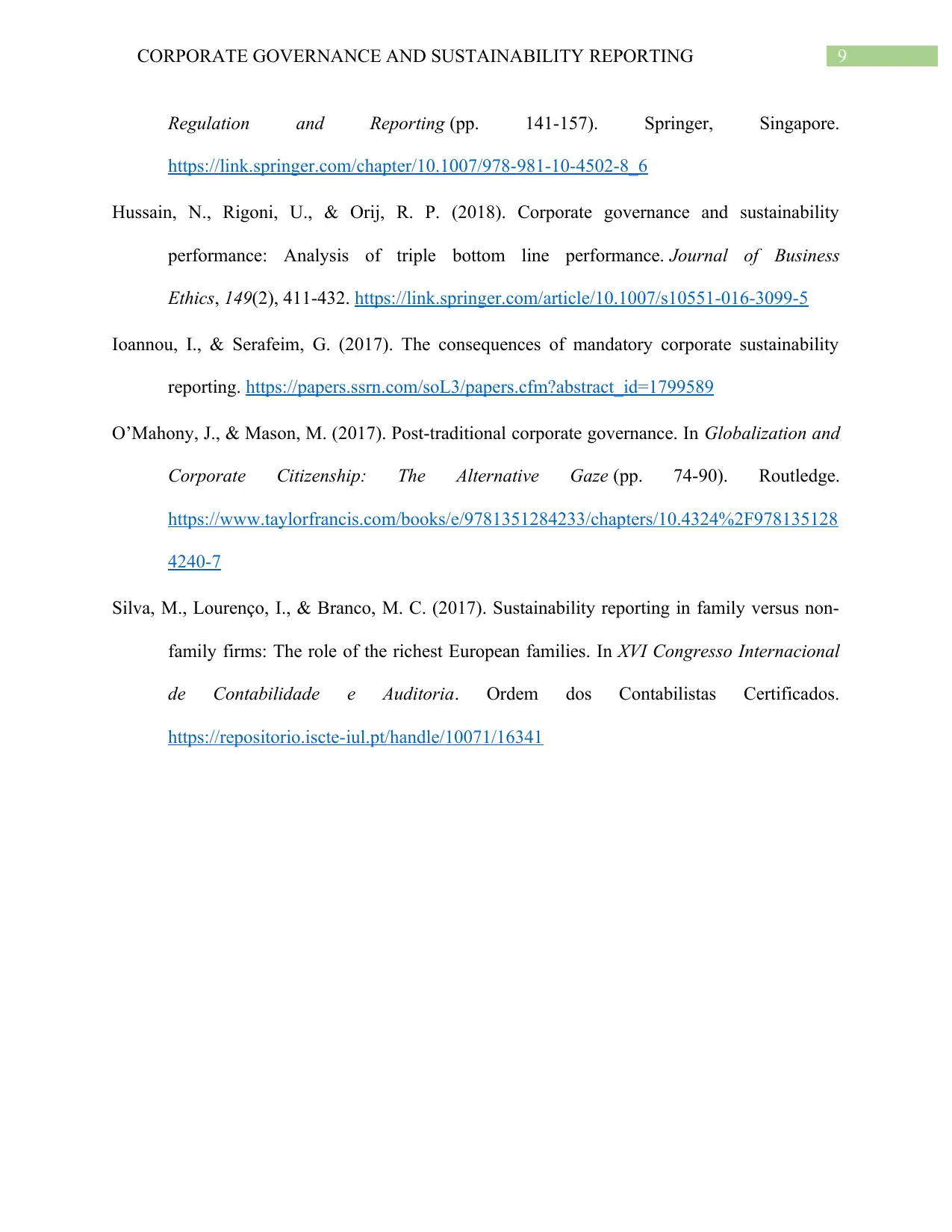
9CORPORATE GOVERNANCE AND SUSTAINABILITY REPORTING
Regulation and Reporting (pp. 141-157). Springer, Singapore.
https://link.springer.com/chapter/10.1007/978-981-10-4502-8_6
Hussain, N., Rigoni, U., & Orij, R. P. (2018). Corporate governance and sustainability
performance: Analysis of triple bottom line performance. Journal of Business
Ethics, 149(2), 411-432. https://link.springer.com/article/10.1007/s10551-016-3099-5
Ioannou, I., & Serafeim, G. (2017). The consequences of mandatory corporate sustainability
reporting. https://papers.ssrn.com/soL3/papers.cfm?abstract_id=1799589
O’Mahony, J., & Mason, M. (2017). Post-traditional corporate governance. In Globalization and
Corporate Citizenship: The Alternative Gaze (pp. 74-90). Routledge.
https://www.taylorfrancis.com/books/e/9781351284233/chapters/10.4324%2F978135128
4240-7
Silva, M., Lourenço, I., & Branco, M. C. (2017). Sustainability reporting in family versus non-
family firms: The role of the richest European families. In XVI Congresso Internacional
de Contabilidade e Auditoria. Ordem dos Contabilistas Certificados.
https://repositorio.iscte-iul.pt/handle/10071/16341
Regulation and Reporting (pp. 141-157). Springer, Singapore.
https://link.springer.com/chapter/10.1007/978-981-10-4502-8_6
Hussain, N., Rigoni, U., & Orij, R. P. (2018). Corporate governance and sustainability
performance: Analysis of triple bottom line performance. Journal of Business
Ethics, 149(2), 411-432. https://link.springer.com/article/10.1007/s10551-016-3099-5
Ioannou, I., & Serafeim, G. (2017). The consequences of mandatory corporate sustainability
reporting. https://papers.ssrn.com/soL3/papers.cfm?abstract_id=1799589
O’Mahony, J., & Mason, M. (2017). Post-traditional corporate governance. In Globalization and
Corporate Citizenship: The Alternative Gaze (pp. 74-90). Routledge.
https://www.taylorfrancis.com/books/e/9781351284233/chapters/10.4324%2F978135128
4240-7
Silva, M., Lourenço, I., & Branco, M. C. (2017). Sustainability reporting in family versus non-
family firms: The role of the richest European families. In XVI Congresso Internacional
de Contabilidade e Auditoria. Ordem dos Contabilistas Certificados.
https://repositorio.iscte-iul.pt/handle/10071/16341
1 out of 10
Related Documents
Your All-in-One AI-Powered Toolkit for Academic Success.
+13062052269
info@desklib.com
Available 24*7 on WhatsApp / Email
![[object Object]](/_next/static/media/star-bottom.7253800d.svg)
Unlock your academic potential
© 2024 | Zucol Services PVT LTD | All rights reserved.





